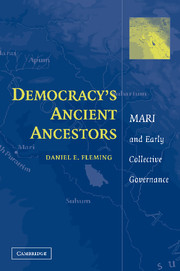Book contents
- Frontmatter
- Contents
- List of Maps and Tables
- Preface
- Acknowledgments
- List of Abbreviations
- Map 1 Ancient Syria and Mesopotamia
- Map 2 The Mari Region
- Map 3 The Ḫabur River Basin
- Democracy's Ancient Ancestors
- 1 Introduction
- 2 The Tribal World of Zimri-Lim
- 3 The Archaic State and the mātum “Land”
- 4 The Collective and the Town
- 5 Conclusions
- Notes
- Glossary of Ancient Terms
- Glossary of Proper Names
- Bibliography
- Subject Index
- Index of Mari Texts
2 - The Tribal World of Zimri-Lim
Published online by Cambridge University Press: 14 July 2009
- Frontmatter
- Contents
- List of Maps and Tables
- Preface
- Acknowledgments
- List of Abbreviations
- Map 1 Ancient Syria and Mesopotamia
- Map 2 The Mari Region
- Map 3 The Ḫabur River Basin
- Democracy's Ancient Ancestors
- 1 Introduction
- 2 The Tribal World of Zimri-Lim
- 3 The Archaic State and the mātum “Land”
- 4 The Collective and the Town
- 5 Conclusions
- Notes
- Glossary of Ancient Terms
- Glossary of Proper Names
- Bibliography
- Subject Index
- Index of Mari Texts
Summary
During the period of the Mari archives, a large proportion of the population identified themselves by tribal social structures that incorporated both settled and mobile communities, whose location overlapped the boundaries of fixed kingdoms across wide swaths of ancient Syria, Turkey, and Iraq. The tribal peoples within the Mari kingdom belonged mainly to two confederations that together represented a coherent duality: the Simʾ alites of the “left (hand)” and the Yaminites of the “right (hand),” probably directional references to north and south. One remarkable discovery of the current Mari publication team is the depth of continuity between urban and nonsedentary segments of the region's population. Far from being set in irrevocable opposition as nomads and townspeople, or even in complementary opposition, this large group considered itself part of one social fabric, divided not by mode of life or place of residence but according to traditional associations of kin.
It is impossible, then, to understand the kingdoms of our Mari period without also exploring the intersection of tribe and town and “land” (mātum). Beyond this value for context, however, tribal social organization is strongly correlated with group-oriented forms of decision making that balance the power of “exclusionary” hierarchies and their individual rulers. The entire Yaminite people are defined as a confederation of five tribes, each with its own ruler. Zimri-Lim seems to have been acknowledged as the one Simʾ alite king, but his actual dealings reveal the monarch's need to negotiate frequently with his own tent-dwelling (Ḫana) tribesmen to win their military support.
- Type
- Chapter
- Information
- Democracy's Ancient AncestorsMari and Early Collective Governance, pp. 24 - 103Publisher: Cambridge University PressPrint publication year: 2004

